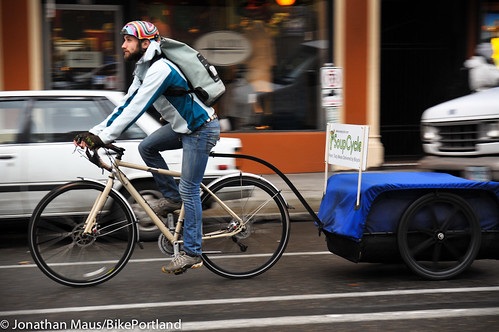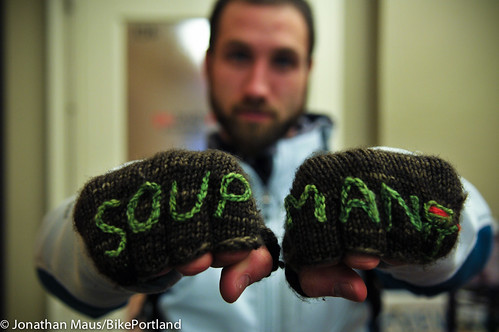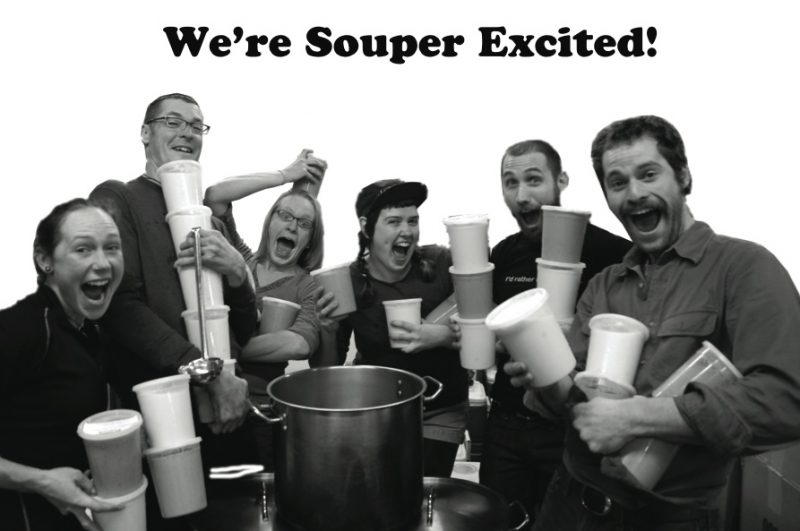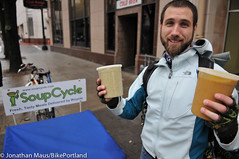
(Photos © J. Maus/BikePortland)
Sometime this week, locally based SoupCycle will make its 50,000th delivery. It’s a milestone that company founder Jed Lazar says “feels incredible and unreal.”
Since Lazar launched the business back in July of 2008, the company has grown to nine employees (two are based in Corvallis) and it shows no signs of slowing down. Hoping to learn the ingredients of his success, I sat down for a chat with Lazar last week.
“I could never have conceived of the reception SoupCycle has gotten,” said Lazar as he thought back to the company’s early days. When he started SoupCycle, he saw it as a three year project. “I wanted to put entire life energy into a company and see where it took me,” he recalled.

His energy has powered SoupCycle into a flourishing business that employees nine people (two of whom are based in Corvallis) and boasts 700 “soupscribers” who pay about $16 a week to have handmade soups, salad and bread delivered to their door.
SoupCycle employs six “SoupCyclers” who pedal a wide swath of the city to fill those orders. The current delivery area (what Lazar calls “Souplandistan”) stretches from SE Holgate to NE Ainsworth and from downtown and Northwest out to 52nd Ave. Instead of offering company bicycles, Lazar has employees ride their own bikes. He says that’s because he spent a summer as a pedicab operator and he saw how people treated company trikes. “They’ll take care of it better if it’s their own bike,” said Lazar, “I also want people to know their bike and feel comfortable riding it.” (Employees get a monthly bike maintenance stipend.)

From L to R: Asta Chastain (SoupCycler), Matthew Stupey (Chef), Jen Bishop (Finances), Montana Maurice (SoupCycler), Jed Lazar (CEO), Joel Shupak (SoupCycler). (Three employees not shown).
The set-up of choice is a cargo trailer (made by Blue Sky Cycle Carts in Sutherlin, Oregon) that attaches to the bike’s seatpost with the signature blue tonneau cover and the SoupCycle billboard toward the front. Lazar says he used electric-assist in the past but has scrapped it as his customer base grew because the batteries couldn’t carry enough charge to last an entire delivery route. “I’d have this heavy bike with the dead battery and no charge left in it.”
With all the great cargo-bike options available these days, I asked Lazar why he doesn’t use a bakfiets or other cargo-specific bike. “Cargo bikes cost about $3,500, our trailers are 1/6th of that price.” A fleet of pick-up trucks would be even more expensive; and keeping overhead down has been a key to his success.

Lazar started SoupCycle just after the economic meltdown, which you’d think wouldn’t be a smart business decision; but he actually credits that for part of his success. “I’m really happy that we started the business just after the recession hit, rather than before. Knowing that, it made us start a really frugal and lean… We’re kind of DIY business and that has saved us because who knew we’d have a recession that lasted this long?”
“Nobody is going to sign up for SoupCycle just because they like bikes, they’ll sign up because our soups are incredible. They like, as a side note, that it’s delivered sustainably.”
So, how has a soup-by-bike business lasted so long and done so well? Surprisingly, Lazar says it’s not about the bike.
“We don’t rely on the bicycle to bring in our customers,” he says, “Our success came because we do what we do extremely well. Nobody is going to sign up for SoupCycle just because they like bikes, they’ll sign up because our soups are incredible. They like, as a side note, that it’s delivered sustainably.”
A few of his customers don’t even know they deliver by bike “until we show up with a helmet on,” he says.
Even his employees don’t show up because simply because they love biking. “The incredible thing about Portland,” says Lazar, “Is that there’s a wealth of bike-loving foodies and my employees are all of both.”

Lazar figures he’s made about 15,000 of the company’s 50,000 deliveries; but as the business has grown, he has stepped back from his weekly delivery duties. When I asked about his time out on the streets pedaling soup around the city, he remembered the dog days of winter, when the relentless rain and cold made deliveries a challenge. “I remember gloves so wet I could wring a puddle out of them… Delivering in the winter was tough, but that’s when soup is really popular!”
“When somebody in rural Ohio hears that a soup company delivered 50,000 soups by bicycle, it has to make them consider bikes in a new light — as an actual, plausible alternative to the way business is done in America.”
The job is much easier, he adds, because of the warm reception he gets from customers and people on the streets (except for bike messengers, whom Lazar says won’t smile back at him due to what he sees as a “huge cultural rift between them and SoupCyclers”).
“I think it’s one of the best jobs in the city. People are happy to see a successful bicycle-based business because it fits into their idea of the world they want to live in.” Then Lazar added with a laugh, “And I think people are happy to to get food delivered to them.”
Beyond dollars and cents, Lazar embraces the activism side of his business. But when he first started out, Lazar recalls being timid about putting green first. “I had some fear around making our mission about sustainability because I knew not all our customers would be interested in that.” But as SoupCycle has grown, so too has Lazar’s confidence. “Now that we have a strong base of loyal customers, I’m more confident that our message can be focused on why we started the business in the first place — local, organic, sustainable, bicycles, sign the petition!”

A former treasurer for the now-defunct Bicycle Business League (which he says is no longer active simply because all the members are too busy running their businesses), Lazar knows that he represents something greater than just his company.
Lazar acknowledges that one of the purposes of SoupCycle is to “promote a green lifestyle” and the more people hear about his success, the more he’s fulfilling that mission.
“When somebody in rural Ohio hears that a soup company delivered 50,000 soups by bicycle, it has to make them consider bikes in a new light — as an actual, plausible alternative to the way business is done in America. They probably won’t start a bike-based business, but they might try commuting by bike.”
— SoupCycle is just one of many Portland-based companies that are proving bicycles can make viable delivery and freight-hauling vehicles. For others, check out Portland Pedal Power, B-Line PDX, and Magpie Messenger Collective.


